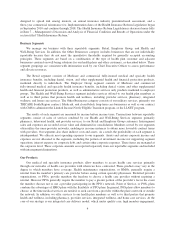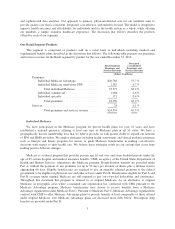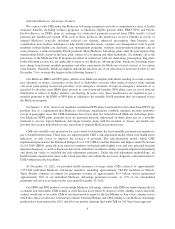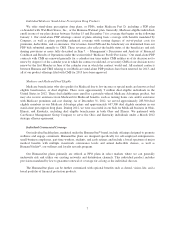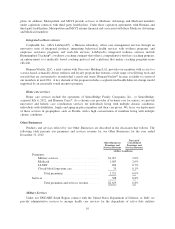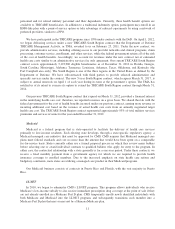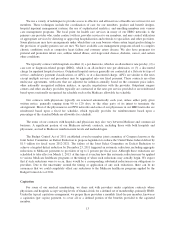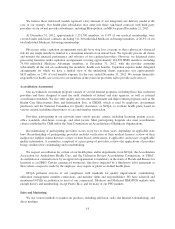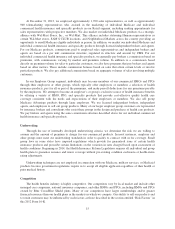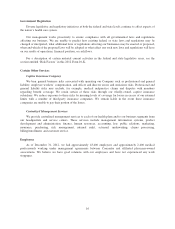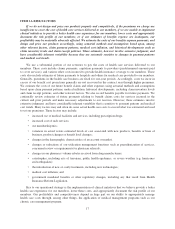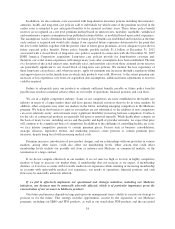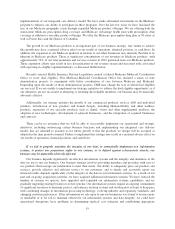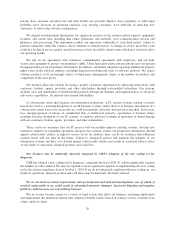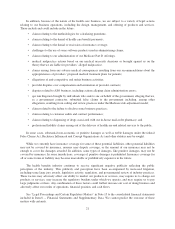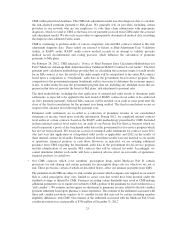Humana 2012 Annual Report Download - page 24
Download and view the complete annual report
Please find page 24 of the 2012 Humana annual report below. You can navigate through the pages in the report by either clicking on the pages listed below, or by using the keyword search tool below to find specific information within the annual report.We believe these risk-based models represent a key element of our integrated care delivery model at the
core of our strategy. Our health plan subsidiaries may enter into these risk-based contracts with third party
providers or our owned provider subsidiaries, including Metropolitan, an MSO acquired December 21, 2012.
At December 31, 2012, approximately 1,131,700 members, or 9.4% of our medical membership, were
covered under risk-based contracts, including 511,700 individual Medicare Advantage members, or 26.5% of our
total individual Medicare Advantage membership.
Physicians under capitation arrangements typically have stop loss coverage so that a physician’s financial
risk for any single member is limited to a maximum amount on an annual basis. We typically process all claims
and monitor the financial performance and solvency of our capitated providers. However, we delegated claim
processing functions under capitation arrangements covering approximately 124,500 HMO members, including
73,500 individual Medicare Advantage members, at December 31, 2012, with the provider assuming
substantially all the risk of coordinating the members’ health care benefits. Capitation expense under delegated
arrangements for which we have a limited view of the underlying claims experience was approximately
$633 million, or 2.0% of total benefits expense, for the year ended December 31, 2012. We remain financially
responsible for health care services to our members in the event our providers fail to provide such services.
Accreditation Assessment
Our accreditation assessment program consists of several internal programs, including those that credential
providers and those designed to meet the audit standards of federal and state agencies, as well as external
accreditation standards. We also offer quality and outcome measurement and improvement programs such as the
Health Care Effectiveness Data and Information Sets, or HEDIS, which is used by employers, government
purchasers and the National Committee for Quality Assurance, or NCQA, to evaluate health plans based on
various criteria, including effectiveness of care and member satisfaction.
Providers participating in our networks must satisfy specific criteria, including licensing, patient access,
office standards, after-hours coverage, and other factors. Most participating hospitals also meet accreditation
criteria established by CMS and/or the Joint Commission on Accreditation of Healthcare Organizations.
Recredentialing of participating providers occurs every two to three years, depending on applicable state
laws. Recredentialing of participating providers includes verification of their medical licenses; review of their
malpractice liability claims histories; review of their board certifications, if applicable; and review of applicable
quality information. A committee, composed of a peer group of providers, reviews the applications of providers
being considered for credentialing and recredentialing.
We request accreditation for certain of our health plans and/or departments from NCQA, the Accreditation
Association for Ambulatory Health Care, and the Utilization Review Accreditation Commission, or URAC.
Accreditation or external review by an approved organization is mandatory in the states of Florida and Kansas for
licensure as an HMO. Certain commercial businesses, like those impacted by a third-party labor agreement or
those where a request is made by the employer, may require or prefer accredited health plans.
NCQA performs reviews of our compliance with standards for quality improvement, credentialing,
utilization management, member connections, and member rights and responsibilities. We have achieved and
maintained NCQA accreditation in most of our commercial, Medicare and Medicaid HMO/POS markets with
enough history and membership, except Puerto Rico, and for many of our PPO markets.
Sales and Marketing
We use various methods to market our products, including television, radio, the Internet, telemarketing, and
direct mailings.
14


